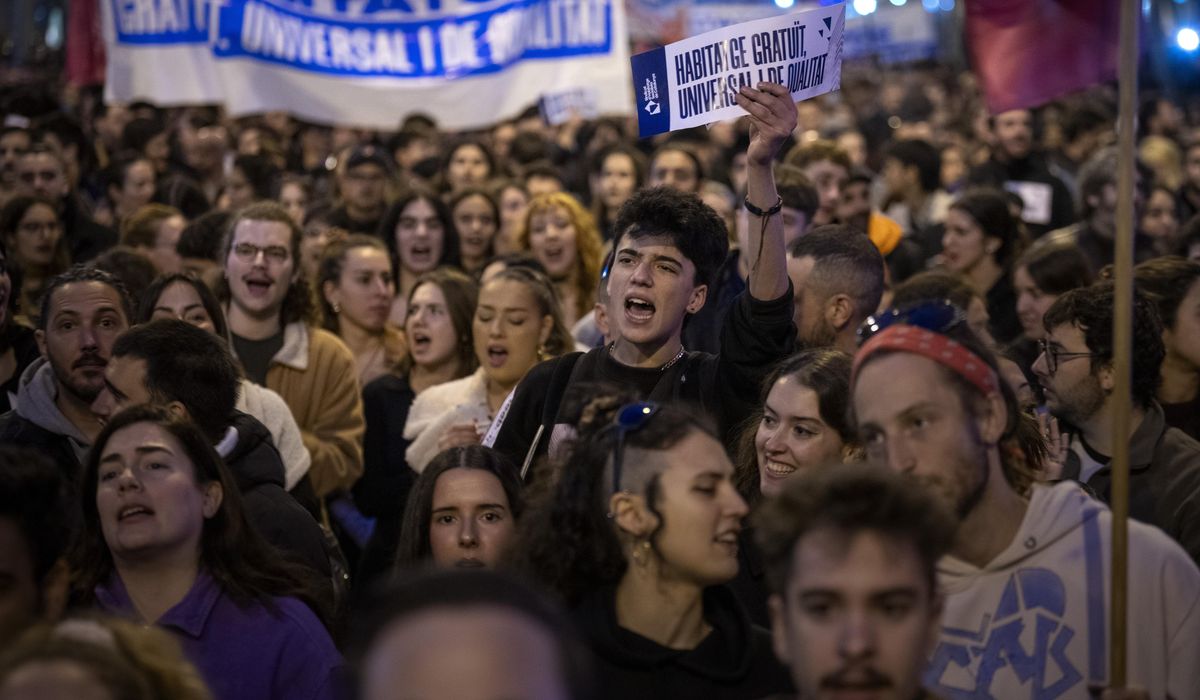Tens of 1000’s of Spaniards protest housing crunch and excessive rents in Barcelona

BARCELONA, Spain — Tens of thousands of Spaniards marched in downtown Barcelona on Saturday to protest the skyrocketing cost of renting an apartment in the popular tourist destination.
Protesters cut off traffic on main avenues in the city center, holding up homemade signs in Spanish reading “Fewer apartments for investing and more homes for living” and “The people without homes uphold their rights.”
The lack of affordable housing has become one of the leading concerns for the southern European Union country, mirroring the housing crunch across many parts of the world, including the United States.
Organizers said that over 100,000 had turned out, while Barcelona’s police said they estimated some 22,000 marched.
Either way, the throngs of people clogging the streets recalled the massive separatist rallies at the heigh of the previous decade’s Catalan independence movement. Now, social concerns led by housing have displaced political crusades.
That is because the average rent for Spain has doubled in last 10 years. The price per square meter has risen from 7.2 euros ($7.5) in 2014 to 13 euros this year, according to the popular online real estate website Idealista. The growth is even more acute in cities like Barcelona and Madrid. Incomes meanwhile have failed to keep up, especially for younger people in a country with chronically high unemployment.
Protestor Samuel Saintot said he is “frustrated and scared” after being told by the owners of the apartment he has rented for the past 15 years in Barcelona’s city center that he must vacate the premises. He suspects that the owners want him out so they can renovate it and boost the price.
“Even looking in a 20- or 30-kilometer radius outside town, I can’t even find anything within the price range I can afford,” he told The Associated Press. “And I consider myself a very fortunate person, because I earn a decent salary. And even in my case, I may be forced to leave town.”
A report by the Bank of Spain indicates that nearly 40% of Spaniards who rent dedicate an average of 40% of their income to paying rents and utilities, compared to the European Union average of 27% of renters who do so.
“We are talking about a housing emergency. It means people having many difficulties both in accessing and staying in their homes,” said Ignasi Martí, professor for Esade business school and head of its Dignified Housing Observatory.
The rise in rents is causing significant pain in Spain, where traditionally people seek to own their homes.
Rental prices have also been driven up by short-term renters including tourists. Many migrants to Spain are also disproportionately hit by the high rents because they often do not have enough savings.
Spain is near the bottom end of OECD countries with under 2% of all housing available being public housing for rent. The OECD average is 7%. Spain is far behind France, with 14%, Britain with 16%, and the Netherlands with 34%.
Carme Arcarazo, spokesperson for Barcelona’s Tenants Union which helped organize the protest, said that renters should consider a “rent strike” and cease paying their monthly rents in a mass protest movement.
“I think we the tenants have understood that this depends on us. That we can’t keep asking and making demands to the authorities and waiting for an answer. We must take the reins of the situation,” Arcarazo told the AP. “So, if they (the owners) won’t lower the rent, then we will force them to do it.”
The Barcelona protest came a month after tens of thousands rallied against high rents in Madrid.
The rising discontent over housing is putting pressure on Spain’s governing Socialist party, which leads a coalition on the national level and is in charge of Catalonia’s regional government and Barcelona’s city hall.
Spanish Prime Minister Pedro Sánchez presided over what the government termed a “housing summit” including government officials and real estate developers last month. But the Barcelona’s Tenants Union boycotted the event, saying it was like calling a summit for curing cancer and inviting tobacco companies to participate.
The leading government measure has been a rent cap mechanism that the central government has offered to regional authorities based on a price index established by the housing ministry. Rent controls can be applied to areas deemed to be “highly stressed” by high rental prices. Catalonia was the first region to apply those caps, which are in place in downtown Barcelona.
Many locals blame the million of tourists who visit Barcelona, and the rest of Spain, each year for the high prices. Barcelona’s town hall has pledged to completely eliminate the city’s 10,000 so called “tourist apartments,” or dwellings with permits for short-term rents, by 2028.


